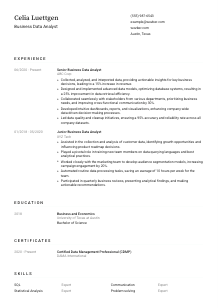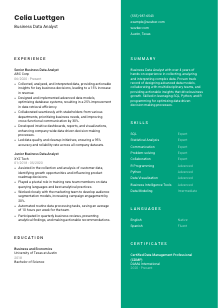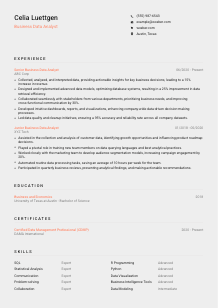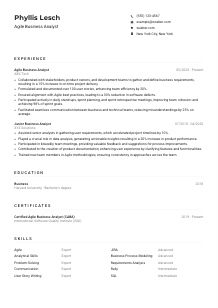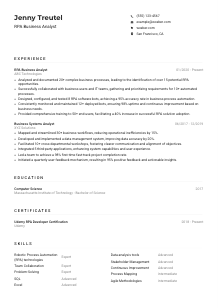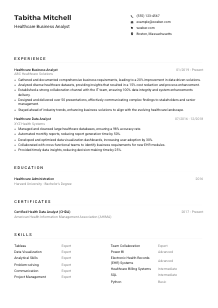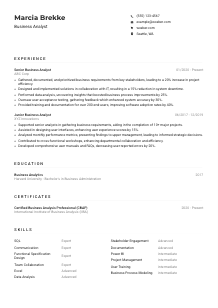Business Data Analyst CV Example
Decoding data, but your CV is an enigma? Dive into this Business Data Analyst CV example, crafted with Wozber free CV builder. Unravel how you can weave your analytical insights to match job metrics, setting your career trajectory in a data-driven direction!
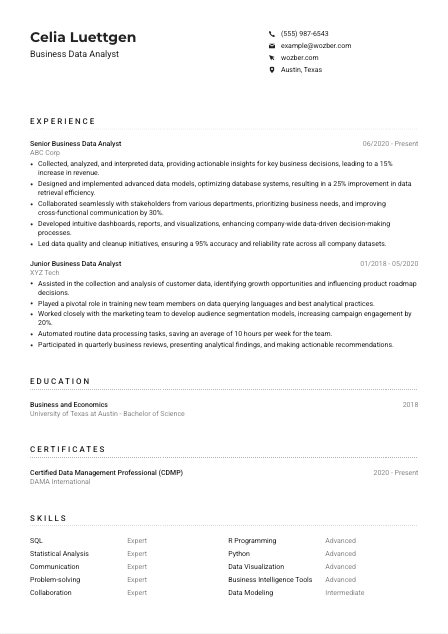
How to write a Business Data Analyst CV?
Envision yourself as the ideal candidate for that Business Data Analyst position you've got your eye on. Imagine a CV that not only showcases your expertise but also speaks directly to the needs of your future employer. That's what we're aiming for. With this guide, powered by Wozber free CV builder, we delve deep into creating a CV that's not just a collection of experiences and skills but a compelling narrative.
Tailored to match the job you want, our focus is on a CV that passes through ATS filters with ease and impresses from the first read. Ready to unlock the potential of your professional story?
Personal Details
The first glance at your CV frames the initial impression. Let's harness this opportunity to immediately resonate with the hiring committee for the Business Data Analyst role.
1. Emphasize Your Name
Think of your name as your personal logo. Set it apart with a clean, prominent font. It's the banner under which all your achievements stand, so make it memorable.
2. Nail the Job Title
Directly below your name, make it clear what you're gunning for - "Business Data Analyst." This signals immediately to the hiring manager that your application is intentional and aligned.
3. Get the Essentials Right
- Phone Number: Ensure this is a number where you're easily reachable. Accuracy here is as essential as in any dataset you'd analyze.
- Professional Email: First impressions count online too. Opt for firstname.lastname@domain.com format – straightforward and professional.
4. Address the Location Requirement
Mentioning "Austin, Texas" directly in your contact info answers a vital job requirement upfront, easing any hiring hesitations regarding relocation.
5. Web Presence
A LinkedIn profile or personal portfolio showcasing your analytical prowess or past projects can be a persuasive tool. Ensure it's updated and reflects your professional narrative accurately.
6. Trim the Excess
Age, marital status, or photo – unless specifically asked, these can be left off. Focus on what matters: your qualifications for the Business Data Analyst position.
Takeaway
Crafting a strong, polished Personal Details section is like extending a confident handshake in digital form. It sets the professional tone for your CV, ensuring that from the get-go, you're taken seriously as a Business Data Analyst candidate.





Experience
Your experience section is the stage where your career narrative shines. Tailor it to illuminate your path as a Business Data Analyst, spotlighting the moments where you've turned data into decisions.
- Collected, analyzed, and interpreted data, providing actionable insights for key business decisions, leading to a 15% increase in revenue.
- Designed and implemented advanced data models, otimizing database systems, resulting in a 25% improvement in data retrieval efficiency.
- Collaborated seamlessly with stakeholders from various departments, prioritizing business needs, and improving cross‑functional communication by 30%.
- Developed intuitive dashboards, reports, and visualizations, enhancing company‑wide data‑driven decision‑making processes.
- Led data quality and cleanup initiatives, ensuring a 95% accuracy and reliability rate across all company datasets.
- Assisted in the collection and analysis of customer data, identifying growth opportunities and influencing product roadmap decisions.
- Played a pivotal role in training new team members on data querying languages and best analytical practices.
- Worked closely with the marketing team to develop audience segmentation models, increasing campaign engagement by 20%.
- Automated routine data processing tasks, saving an average of 10 hours per week for the team.
- Participated in quarterly business reviews, presenting analytical findings, and making actionable recommendations.
1. Dissect the Job Description
Break down the job description to understand the core requirements. For a Business Data Analyst, it's about demonstrating how you've collected, analyzed, and transformed data into business insights.
2. Organize by Impact
Lead with your most recent role, clearly listing your position, the company name, and your tenure there. Structure is key to readability and impact.
3. Highlight Your Achievements
For each role, create bullets that reflect accomplishments relevant to data analysis and business intelligence - like improving revenue through actionable insights or enhancing data retrieval efficiencies.
4. Quantify Success
Whenever possible, back your accomplishments with numbers. Did you increase efficiency by 25% or revenue by 15%? Those metrics make your contributions tangible and impressive.
5. Relevance is Key
Keep each bullet focused on your role as a Business Data Analyst. Side projects or unrelated roles can cloud your narrative, so if they don't add to your story towards this specific role, leave them out.
Takeaway
Think of the Experience section as proof of your journey, showing not just where you've been, but how each step has prepared you for the role of a Business Data Analyst. This is your chance to make the hiring manager see not just a candidate, but the solution to their needs.
Education
In the quest to become a Business Data Analyst, your education forms the bedrock of your expertise. It's essential to present this foundation clearly, highlighting its relevance to the job at hand.
1. Identify Required Education
The job description seeks a Bachelor's degree in Business, Economics, Statistics, or a related field. Ensure your degree mirrors this requirement to affirm your qualification.
2. Present with Clarity
List your degree, the field of study, the institution, and your graduation date in a clean, straightforward format. Precision here mirrors the analytical clarity you'll bring to the Business Data Analyst role.
3. Match Degree to Job
Showcasing your Bachelor of Science in Business and Economics directly links your academic background to the needs of the role, firmly establishing your foundational relevancy.
4. Course Highlights (If Applicable)
If your program included coursework directly relevant to data analysis or business intelligence, listing these can add depth to your qualifications, especially early in your career.
5. Showcase Additional Credentials
Honors, relevant extracurriculars, or specific projects aligned with the Business Data Analyst role can further distinguish your educational background.
Takeaway
Your education section is more than a list of schools; it's a testament to the groundwork you've laid for your career as a Business Data Analyst. Make sure each element aligns with the job's needs, solidifying your candidacy from the foundation up.
Certificates
In the evolving field of data analysis, continuing education is crucial. Certificates can significantly underline your commitment to staying at the forefront of the industry.
1. Align with Job Requisites
While the job description for our Business Data Analyst role doesn't specify certifications, showcasing relevant ones like the Certified Data Management Professional (CDMP) underscores your dedicated expertise.
2. Select Wisely
List certifications that resonate most with the responsibilities of a Business Data Analyst. This demonstrates your targeted commitment to excelling in the field.
3. Date Matters
Including the acquisition or validity dates of your certifications clarifies their current relevance, especially in fast-moving fields like data analysis.
4. Stay Current
The tech landscape is ever-changing, and so should your knowledge. Continuously update your certifications and seek out opportunities that align with the Business Data Analyst trajectory.
Takeaway
In a competitive field like Business Data Analytics, certifications serve as tangible evidence of your skills and dedication to professional growth. They signify not just what you know, but your commitment to knowing more. Select and showcase certifications that boost your profile as a top candidate.
Skills
Your skills section is a compact display of your capabilities. Let's make sure it presents you in the light of an indispensable Business Data Analyst, ready to bring your analytical acumen to the table.
1. Extract from Job Description
Identify the skills directly mentioned in the job posting - SQL, statistical analysis, problem-solving, and collaboration, among others. These are non-negotiables to highlight.
2. Converge with Your Skills
Match your expertise with the job needs. Having a skill in R programming? Rate it as 'Advanced.' This aligns your capabilities with the expectations of a prospective employer.
3. Prioritize and Structure
Focus on presenting the most relevant skills at the top. Organize them starting with the ones explicitly mentioned in the job description to show immediate alignment with the role's requirements.
Takeaway
The skills section is where you get to shout about what you bring to the table. Highlight your proficiency in key areas, making it crystal clear you're not just suitable; you're made for this Business Data Analyst role. Your CV should scream a perfect match, and your skills are a crucial part of that chorus.
Languages
Being multilingual can be a substantial asset, especially in data analysis where insights might cross borders. Showcase your linguistic talents as part of your comprehensive Business Data Analyst profile.
1. Asses Required Languages
Start with the non-negotiable: English proficiency is mandatory for our Business Data Analyst role. Make sure to list it prominently as your primary language.
2. Place Languages Strategically
Starting with English, sequentially list other languages you are proficient in. This demonstrates your readiness to engage in multi-faceted, possibly global, data environments.
3. Detail Your Proficiency
Be specific about your level of command – from 'Native' to 'Basic.' This clarity presents a transparent snapshot of your communication arsenal.
4. Relate to the Job
In roles with international scope or diverse datasets, fluency in additional languages can be immensely advantageous. Highlighting this indicates your preparedness for such challenges.
5. View Languages Holistically
For a Business Data Analyst, being bilingual or multilingual isn't just about communication; it's about understanding diverse data sets and cultures. It's a plus point that broadens your analytical perspectives.
Takeaway
Your proficiency in multiple languages underlines your ability to navigate complex, multicultural data landscapes. Don't underestimate this advantage. Showcase your linguistic skills as keys that unlock more profound insights and broader horizons.
Summary
A compelling summary is your chance to encapsulate your credentials succinctly, making the case for why you're the ideal Business Data Analyst candidate. Let's tailor this section to echo your readiness and expertise.
1. Decode the Job Essence
Start by absorbing every detail of the job requirements. The essence lies not just in the tech skills but in the ability to translate complex data into actionable business insights.
2. Lead with a Strong Introduction
Introduce yourself as a Business Data Analyst with a proven track record. This immediate alignment with the job title sets the tone for your expertise.
3. Reflect Key Qualifications
Highlight your skill in SQL, statistical analysis, and your knack for translating data into strategy. These core competencies directly address the job specs and position you as a capable candidate.
4. Keep It Snappy
Your summary should be concise, yet impactful. Aim for 3-5 sentences that invite the reader to learn more, enticing them to dive into the details of your CV.
Takeaway
Your summary is your CV's elevator pitch. Make it count by weaving in your top qualifications that speak directly to the Business Data Analyst role. This section sets the stage, making hiring managers eager to see what comes next. Let your summary shimmer with potential, making your application impossible to put down.
Launching Your Business Data Analyst Journey
Congratulations on meticulously crafting a CV that stands tall, tailored, and ready to showcase your brilliance as a Business Data Analyst. With Wozber free CV builder at your side, you've navigated the essentials of creating an ATS-friendly CV that not only meets but surpasses expectations. Remember, this CV is your narrative distilled into a document. Let it reflect your unique journey, competencies, and aspirations in the realm of data analysis.
The path ahead is bright. Continue to refine, innovate, and align your professional story with your career aspirations. Your insights have the power to influence decisions; let your CV open the door to those opportunities.

- Bachelor's degree in Business, Economics, Statistics, or a related field.
- A minimum of 3 years of experience in data analysis or business intelligence.
- Proficient in data querying languages (SQL) and statistical programming tools (R, Python).
- Strong analytical and problem-solving skills with the ability to translate complex data into actionable insights.
- Effective communication and collaboration skills to work with cross-functional teams.
- English speaking skills are mandatory.
- Must be located in Austin, Texas.
- Collect, analyze, and interpret data to provide actionable insights for key business decisions.
- Design and implement data models, database systems, and data collection mechanisms.
- Collaborate closely with stakeholders across departments to understand and prioritize business needs.
- Develop dashboards, reports, and visualizations to effectively communicate results and findings.
- Assist in data quality and cleanup initiatives to ensure data accuracy and reliability.





